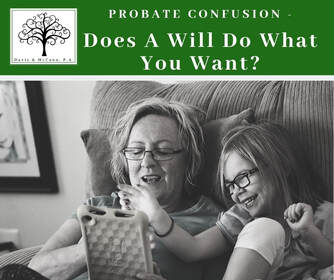 If you or a family member have faced a recent health scare, such as the kind presented by the Coronavirus, it’s likely that you’ve been told to update your Last Will and Testament. You may have had a new Will prepared or had your previous Will updated with a Codicil. While preparing a Will generally is a move in the right direction when it comes to estate planning, it may not be the “best” option for you individually. A Will is one of the most basic levels of estate planning that you can do in order to direct how and to whom your assets will be distributed upon your death. People often misunderstand the estate process and assume that their assets will automatically pass to the beneficiaries found in their Will after their death. What they don’t realize, is that assets that pass by way of a Last Will and Testament must first go through the probate process before any distributions can legally take place. To clear up some of that confusion, here are some answers to common misconceptions surrounding the probate process: 1. If you have a Will, your family will not have to go through a probate. Not true! In fact, if you do Will-based planning, you are planning for a probate. This means your estate will go through a court process and be open to public examination before your beneficiaries will receive their inheritance. Your named Executor under the Will cannot even act on behalf of your estate until the court has granted them approval to do so. 2. Probate is a simple and speedy process. This is rarely true. On average, it takes up to 16 months to settle an estate. That’s a significant wait time for beneficiaries to receive the assets you intended them to have. Additionally, you will need legal assistance if you are required to open a probate in an estate due to the complexity of the process. Professional help from a good probate attorney will be your best insurance for preventing unnecessary expenses and delays during the probate process. 3. Probate will be cheaper than having a Trust. Typically, the opposite is true. You may save money initially by choosing a Will-based plan over a Trust-based plan. However, you must consider that upon your death, your estate will pay for the probate process. This will include additional court fees and attorney fees that are usually far above those necessary for a trust administration. According to a 2018 EstateExec survey, the average U.S. estate was valued between $50,000 and $250,000. The average legal and accounting fees paid were $12,400 and the average executor fees were around $18,000. With a Trust-based plan, the cost to prepare the Trust documents will be more than the cost of a Will initially, but the cost to administer the Trust after your death should be significantly less than a probate action. With a Trust-based plan, Court approval is not required to distribute assets or pay bills. In the end, many individuals save money by creating a Trust, due to the avoidance of the probate process. Additionally, with a Trust-based estate plan, distribution of assets to beneficiaries is typically faster than a Will-based plan. Creating a Trust may seem overly complicated, but a good estate planning attorney can walk you through the process, minimizing expenses, errors and confusion. If you have a question about the Kansas probate process, contact Davis & McCann, P. A., Dodge City, KS. We are members of Wealth Counsel, a national consortium of Estate Planning Attorneys and the National Academy of Elder Law Attorneys (NAELA). We focus our practice on providing clients with the best legal advice on estate planning, Medicaid and long-term care planning, business formation, family business/small business succession planning, probate, trust administration, real estate, and related matters. Comments are closed.
|
NEWS YOU CAN USEDavis & McCann, P. A., Archives
April 2021
Categories
All
|

 RSS Feed
RSS Feed